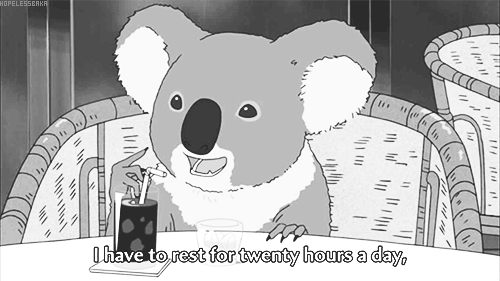There are definitely some days when the phrase “there’s not enough coffee in the world to wake me up” is accurate (although studies have shown that the waking-up effect of caffeine in coffee may be a figment of your imagination). Often, you’ll hear this phrase from new mothers and fathers who have been up night after night with a screaming baby or overworked medical students during their residencies, but it often also applies to undergraduate students. Young adults and adults are thought to need eight hours of sleep each night in order to be prepared for the next day. Do the math really quickly. Are you getting all of the sleep you need?

Taylor Swift / Giphy
It’s hard to make yourself get enough sleep in college. There are a million extracurricular activities pulling you every which way, some of them not starting until after dinner (theater rehearsals and performances, for example) and others requiring you to get up early in the morning (conditioning and workouts for team sports). Throw socializing, attending classes, mealtimes, and bundles of homework on top of that, and it’s actually amazing that college students get any sleep at all. In fact, over 70% of college students report that they get fewer than eight hours of sleep every night.
When you perpetually don’t get enough sleep, you can build up sleep deprivation. Sleep deprivation can accumulate over time. Say you only sleep six hours on Monday, Tuesday, and Wednesday, then only four on Thursday and Friday. Over the week, you’ve missed out on 14 hours of sleep, and each day, you will feel progressively worse. The good news is that you don’t have to get 14 extra hours of sleep to make up the deficit. Two really good nights of sleep, between eight and ten hours, is usually enough to restore your body to normal. It’s not a cycle you want to get into, though. During the week is when you actually need sleep the most, since this is when you’re learning, studying, and trying to create new memories and retain information.

Giphy
Side effects of sleep deprivation include:
- Daytime sleepiness (which can be made worse by sitting in a dark lecture hall or a warm room)
- An increase in crankiness and irritability
- Lack of motivation
- Inability to concentrate
- Forgetfulness and trouble retaining new information
- Drowsy driving (which can cause accidents or death as a result of falling asleep at the wheel)
If you think sleep deprivation is as bad as it gets, think again. Pulling an all-nighter is arguably one of the worst things you can do for your mental health and memory if you’re trying to finish a paper or cram in a few more hours of studying for a midterm. In order to create new memories and retain information, your body requires sleep. One study showed that after students pulled an all-nighter, they couldn’t perform well on a visual task for the following two days. It takes a long time to recover from such a traumatic (sleep-wise) event. Your best bet is to study between dinner and your normal bedtime and try to get at least a few hours of sleep instead of trying to pack in information all night long. After a while, you’ll just be reading the same paragraph over and over again, trust me.
There are three main behaviors to change if you want to improve the quality of your sleep:

Monsters Inc. / Giphy
- Computers, phones, and television: As a college student, the idea of turning off your computer and phone more than an hour before bed is insane. You’re in college. You have homework, most of which involves the internet or a word processor. Not to mention that your entire social network can be reached through your phone. The light from technology, though, is entirely unnatural. The human body is hardwired to take in cues from the sun and program sleep based on those cues (you’re awake when it’s light and asleep when it’s dark). The light coming from your devices is enough to trick your body into staying awake. If you must use technology at night, consider downloading the f.lux app to automatically dim your screens based on what time it is.
- Caffeine: Since caffeine is a chemical that blocks adenosine receptors (which promote sleepiness) in your brain, it is often used as a pick-me-up when people need a burst of energy. The thing is, though, that caffeine can affect you up to 14 hours after you ingested it. Obviously, then, the closer to bedtime that you have a cup of coffee or tea, the more likely it is to prevent you from feeling sleepy. You’ll take much longer to fall asleep and your rapid eye movement (REM) sleep may also be interrupted. Consider limiting your caffeine intake after lunch.

Brooklyn Nine-Nine / Giphy
- Alcohol: Drinking before bed may make it easier for you to fall asleep, but it actually decreases the quality of the sleep that you’re experiencing. You’ll wake up more and more often the closer it gets to morning, and you won’t reach deep REM sleep. REM is the part of your sleep cycle when you experience dreams, and it is the most restorative part of your sleep cycle.
If you’ve limited your alcohol and caffeine intake and installed f.lux on your phone and computer but find that your mind is racing with anxiety or that you just can’t seem to fall asleep and stay asleep at night, try out some of these tips:
- Try to get regular exercise every day. Even just two and a half hours of exercise each week is enough to improve sleep quality, decrease daytime sleepiness, and improve concentration.

Giphy
- Sleep with your phone and computer more than an arm’s length away from your bed. If you have to get up in order to get back in bed and play with your phone, chances are you’ll just leave it where it is.
- Go to sleep and wake up at the same time every day. Once your body gets used to the pattern, it’ll automatically start feeling sleepier around your chosen bedtime and want to wake up in time for your daily routine.
- Turn the temperature down at night. The best temperature for sleeping is between 60° and 67° F. Not only does this lower your risk for diseases like diabetes, but it makes falling asleep easier. When you sleep, your body temperature automatically drops. If you’re hot to begin with, your body has a hard time regulating and you may feel restless.
- Relax. Try to concentrate on your breathing by taking deep even breaths that get progressively deeper as you go on. Pay attention to every muscle in your body, tensing them up tightly and then completely relaxing them. Start with your toes and work your way up. Let go of any anxiety-inducing thoughts. Everything can be dealt with in the morning.
- Take a melatonin supplement. Melatonin is the body’s naturally produced sleep hormone. If you are finding that nothing else works and falling asleep is tricky, trying a low-dose melatonin pill may be an option. Melatonin is available over the counter as a supplement in grocery stores and pharmacies, but since it is not regulated by the FDA, you should talk to your doctor about his or her recommendations before embarking on a course of action.

Giphy
There’s always the option to count sheep as a last resort, but changing your habits should help you sleep better. It’s up to you to make sleep a college priority. Yes, you’ve got a lot going on, but your GPA, your attention span, and your memory will all thank you if you try to get in those eight hours. Sleep tight!
-
How to Avoid Burnout in All Areas of Your Life
-
Should I Take the Student Health Insurance or Stay on a Parent’s Plan?
-
Grocery Shopping for Finals Week: Food to Keep You Full and Focused
-
Put Your Insomnia to Rest: Sleeping Well in Times of Stress
-
Six Ways to Cope if You’re Feeling Overwhelmed in College
-
Health Insurance for Students: Your Options, Simplified
-
Getting Nutrients from Your Meal Plan
-
Mental Health Boosts to Keep You on Track in the Winter
-
Study Drugs: Why They’re Unhealthy, Unsafe, and Unnecessary
-
Seasonal Affective Disorder in College: Coping with Winter Depression
-
¿Dónde está tu motivación al despertar?
-
Six Yoga Poses to Help with Anxiety and Panic Attacks



